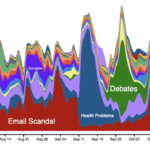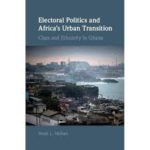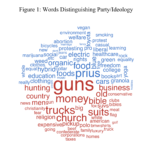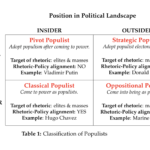Post developed by Katherine Pearson
Since its establishment in 2013, a total of 168 posts have appeared on the Center for Political Studies (CPS) Blog. As we approach the new year, we look back at the most popular topics of 2019. Listed below are the recent posts that you found most interesting on the blog this year.
1. Political Communication Meets Big Data
 How do voters make sense of the information they hear about candidates in the news and through social media? This question was at the heart of a collaboration between researchers at the University of Michigan, Georgetown University, and Gallup to study political communication that took place during the 2016 U.S. presidential election. Results from the project will be published in a new book, Words That Matter, in May 2020.
How do voters make sense of the information they hear about candidates in the news and through social media? This question was at the heart of a collaboration between researchers at the University of Michigan, Georgetown University, and Gallup to study political communication that took place during the 2016 U.S. presidential election. Results from the project will be published in a new book, Words That Matter, in May 2020.
2. New Book Examines Ghana’s Political Trap
 In his new book, Electoral Politics and Africa’s Urban Transition, Noah Nathan traces the unexpected political patterns that are emerging in urban Ghana. Despite a growing middle class and increasing ethnic diversity, clientelism and ethnic voting persist in many urban neighborhoods.
In his new book, Electoral Politics and Africa’s Urban Transition, Noah Nathan traces the unexpected political patterns that are emerging in urban Ghana. Despite a growing middle class and increasing ethnic diversity, clientelism and ethnic voting persist in many urban neighborhoods.
3. Divided by Culture: Partisan Imagery and Political Evaluations
 Increasingly, Americans associate partisan leanings with otherwise non-political objects. Dan Hiaeshutter-Rice, Fabian G. Neuner, and Stuart Soroka examine the consequences of these associations in their paper “Divided by Culture: Partisan Imagery and Political Evaluations”, which they presented at the Midwest Political Science Association meeting on Saturday, April 6, 2019.
Increasingly, Americans associate partisan leanings with otherwise non-political objects. Dan Hiaeshutter-Rice, Fabian G. Neuner, and Stuart Soroka examine the consequences of these associations in their paper “Divided by Culture: Partisan Imagery and Political Evaluations”, which they presented at the Midwest Political Science Association meeting on Saturday, April 6, 2019.
4. Angela Ocampo Examines the Importance of Belonging
 The idea of belonging, or attaining inclusion, is the centerpiece of Angela Ocampo’s research. Her dissertation received the American Political Science Association’s (APSA) Race and Ethnic Politics Section’s award for the best dissertation in the field at the Fall 2019 APSA meetings.
The idea of belonging, or attaining inclusion, is the centerpiece of Angela Ocampo’s research. Her dissertation received the American Political Science Association’s (APSA) Race and Ethnic Politics Section’s award for the best dissertation in the field at the Fall 2019 APSA meetings.
5. Computer simulations reveal partisan gerrymandering
 Jowei Chen developed a new way to analyze legislative districts and determine whether they have been unfairly gerrymandered for partisan reasons. Chen, an Associate Professor of Political Science and a Research Associate at the Center for Political Studies, used computer simulations to produce non-partisan districting plans that follow traditional districting criteria.
Jowei Chen developed a new way to analyze legislative districts and determine whether they have been unfairly gerrymandered for partisan reasons. Chen, an Associate Professor of Political Science and a Research Associate at the Center for Political Studies, used computer simulations to produce non-partisan districting plans that follow traditional districting criteria.
6. Improving Research on Subnational Violence with xSub
 xSub, a new freely available resource, builds the infrastructure to compare data on political conflicts and violence at a subnational level (i.e., states, cities, and villages). This database of databases allows researchers to construct custom, analysis-ready datasets. xSub includes data on conflicts in 156 countries, from 21 sources.
xSub, a new freely available resource, builds the infrastructure to compare data on political conflicts and violence at a subnational level (i.e., states, cities, and villages). This database of databases allows researchers to construct custom, analysis-ready datasets. xSub includes data on conflicts in 156 countries, from 21 sources.
7. Portrait of a birther: White conservatives with political knowledge more likely to believe Obama conspiracy
 White conservatives who not only have racial animus but are also knowledgeable about politics were the most likely group to believe that former President Barack Obama was not born in the United States, according to a University of Michigan Institute for Social Research study.
White conservatives who not only have racial animus but are also knowledgeable about politics were the most likely group to believe that former President Barack Obama was not born in the United States, according to a University of Michigan Institute for Social Research study.
8. Racial Dynamics in the American Context : A Second Century of Civil Rights and Protest?
 Drawing from published work that will be compiled as a new book, Black Politics After the Civil Rights Revolution, Dianne Pinderhughes explored the arc of 20th-century civil rights reform and the growing political incorporation of African Americans into electoral politics when she delivered the 2019 Hanes Walton, Jr. lecture.
Drawing from published work that will be compiled as a new book, Black Politics After the Civil Rights Revolution, Dianne Pinderhughes explored the arc of 20th-century civil rights reform and the growing political incorporation of African Americans into electoral politics when she delivered the 2019 Hanes Walton, Jr. lecture.
9. Toward a Typology of Populists
 The rise in populism around the world has received much attention, but not all populists are the same. In a new paper, Pauline Jones and Anil Menon present an original typology of populists that goes beyond typical left-wing versus right-wing classifications.
The rise in populism around the world has received much attention, but not all populists are the same. In a new paper, Pauline Jones and Anil Menon present an original typology of populists that goes beyond typical left-wing versus right-wing classifications.
10. Incidental Exposure to Political News Increases Political Knowledge
 We’re immersed in a media landscape full of choices. News, information, and entertainment are all at our fingertips. But does this mean that people are better informed about important issues? Brian Weeks, Daniel S. Lane, Lauren B. Potts, and Nojin Kwak conducted two surveys to answer this question.
We’re immersed in a media landscape full of choices. News, information, and entertainment are all at our fingertips. But does this mean that people are better informed about important issues? Brian Weeks, Daniel S. Lane, Lauren B. Potts, and Nojin Kwak conducted two surveys to answer this question.

